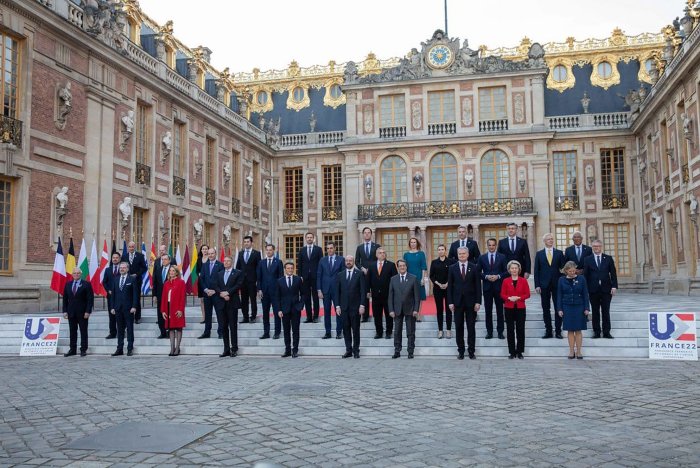1 of 3 | Ukrainian police inspect the site of a Russian bombing attack in front of a destroyed apartment building in Kyiv, Ukraine, on Monday. Photo by Vladyslav Musiienko/UPI |
License Photo
March 15 (UPI) -- Ukraine's economy could contract by as much as 35%, the International Monetary Fund said, as Russia's invasion of the Eastern European country has caused widespread destruction, death and displacement.
In a report produced by the global lender and published Monday, the IMF said Ukraine's growth outlook for the fiscal year is expected to drop by at least 13.5 percentage points compared to its pre-war baseline while its gross domestic product will fall a minimum of 10% -- and that's if the war ends soon and Kyiv receives "substantial" donor support.
Based on wartime GDP data from countries such as Syria, Iraq and Lebanon, Ukraine's output production contraction could eventually hit between 25% and 35%, it said.
The output contraction is fueled by increasing loss of physical capital stock and mass migration, which could cause a collapse in trade flows and diminished tax collection capacity, it said, adding that this is on top of domestic demand sharply dropping as people limit themselves to basic necessities as the war continues.
Supply disruptions, destruction of infrastructure, lack of access to international and domestic markets and uncertainty with as many as 4 million people forecast to potentially flee the country are also contributing factors, which are now occurring amid high inflation and spiking gas import prices as well as the spread of the pandemic.
"Already damages on infrastructure are massive," IMF Managing Director Kristalina Georgieva told reporters during a press conference. "We have shortages of food, medicine; in some parts of the country electricity running short; and thee most valuable part of Ukraine's richness -- it's human capital -- is leaving in numbers we have not seen in Europe since the Second World War.
"Even if hostilities were to end right now, the recovery and reconstruction costs are already massive."
The report was announced as Russia increases its attacks upon cities and population centers as part of its war that started Feb. 24.
According to data from the United Nations Human Rights Office of the High Commissioner, 636 civilians have been killed as of midnight Sunday and 1,125 others have been injured.
The number of people exiting Ukraine has also been steadily climbing, with 2.8 million have fled the country, the UNHCR said.
Against this backdrop of war and an increasing humanitarian crisis, the IMF expects Ukraine to face "a deep recession" though hedging it forecasts by warning that they are subject to "massive uncertainty" due to the war.
The report and press briefing follows the IMF last week unveiling a $1.4 billion emergency assistance package to help Ukraine cover urgent needs and mitigate war effects.
That comes on top of the $700 million the IMF disbursed to Ukraine in December and the $2.7 billion it received from the IMF Special Drawing Rights last summer.
Georgieva told reporters that they are discussing further support with Ukraine and that they are ready to provide additional financing.
"At this point, as I said, the most critical ask from us is to make sure that Ukraine functions," she said.
On Sunday, Georgieva told CBS' Face the Nation that international sanctions imposed against Russia over its invasion of Ukraine have already taken a bite out of its economy and they expect it to also slide into a deep recession.
On Monday, she said this is having a spillover effect into nations integrated with either Ukraine's or Russia's economy, particularly those in Central Asia, the Caucuses, Moldova and the Baltic countries.
The report continues that Russia's aggression will also lead to the worldwide deterioration of food security, surging of energy and commodity prices, rising inflationary pressures, disruption of supply chains, increasing social spending for refugees and increasing poverty.
"The global economic damage of this war will be devastating," the report said.
European Union leaders attend a summit at the Chateau de Versailles near Paris on March 11, 2022. Photo by the European Union/ UPI |
License Photo
















